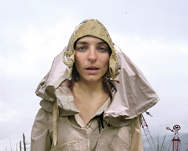Mary Mattingly The artist who invented the “Wearable Home,” is now preparing to spend months in an off-grid floating home off Manhattan.
In 2005, Mary Mattingly proposed the idea that an all-weather jumpsuit equipped with solar panels and a water purifier might be all the shelter a person needs. Now the 30-year-old sculptor and photographer from Queens, is about to move, with several others, to a 30-by-100-foot barge moored at the Brooklyn Navy Yard.
Communities
The Waterpod is designed to explore the possibility of self-sufficient communities on the water that might offer an alternative to living on land in the future, if “our resources on land grow scarcer and sea levels rise,” she said.
The $150,000 project, financed with private donations and grants, is intended to be self-sustaining: food will be grown onboard, some of it in hydroponic gardens; drinking water derived from purified rainwater; electricity generated through a mix of solar, wind and bicycle power; and waste recycled into compost.
The residents will have to endure constant exposure to the elements, the cramped quarters, the daily chores (something as simple as using a laptop may require furious pedaling on the bicycle that generates electricity) and the lack of privacy created by the constant influx of guest artists and curious onlookers.
Alison Ward, a 37-year-old visual and performance artist who will be a member of the crew, said she had given up her Brooklyn apartment, shed her furniture and put the rest of her stuff in storage, and is couch surfing until she can move on board. “I’m thinking about this as a launching point for a different way of life,” she said. “I love the idea of nomadism.”
Costs
When their barge sank a marine yard in New Jersey rented them the current vessel for $3,600 a month.
Towing and docking the Waterpod has required eight insurance policies, at a cost of $18,000, and obtaining permits from the Coast Guard and a host of state and local agencies. Even the chickens came with a bureaucratic hitch: because the public would be visiting, Mr. McGarvey was told by the city that he needed a permit for animal exhibition.
“We worked out a deal with the Union Square Greenmarket, where we’re going to barter for food,” she told the New York Times. She hadn’t yet figured out what to offer in exchange. But she didn’t seem particularly troubled by that, or by the fact that supplementing the food supply meant that their community wouldn’t actually be self-sustaining.
Auto Amazon Links: No products found.

